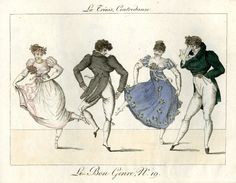I share these with you partly to set the record straight about some common misconceptions, and partly just to celebrate the unique and remarkable era we know as the Regency.
 Chocolate — Chocolate was a bitter, hot drink like coffee, not the decadent dessert we know today. It was considered very decadent and only the finest chefs knew how to prepare it. Therefore, only the very rich drank it.
Chocolate — Chocolate was a bitter, hot drink like coffee, not the decadent dessert we know today. It was considered very decadent and only the finest chefs knew how to prepare it. Therefore, only the very rich drank it.
Ankles — It was not scandalous for ladies to show their ankles. In fact, several drawings and engravings of the era show ladies with skirts barely reaching their ankles. Since their dancing slippers were similar to today’s ballerina flats, the ankles were clearly visible. As shoe styles changed from slippers into boots of the Victorian Era, it also became a sign of modesty to keep one’s ankles covered. Hence, showing ankles was scandalous during the Victorian Era, but not the Regency Era.
Unmentionables — Ladies did not wear anything under their gowns except a shift or a chemise, stays which are similar to a corset but less restrictive, and stockings. Layers of petticoats would have messed up the slender silhouette of the Regency gowns. During very cold weather, ladies may have worn petticoats to stay warm however, it was not a common practice. And no, ladies did not wear pantaloons or pantalets either–those appeared during the next era along with all the layers of petticoats.
Annulments — Marriages in Regency England could not be annulled by non-consummation. Period. There were extremely rare cases of marriages being annulled but they were rare, messy, scandalous, and– did I mention–extremely rare?
 Stale Bread — Due to the Napoleonic War and subsequent blockages, wheat was hard to come by. This meant that bread, a main staple in the Englishman’s diet, became scarce. In an attempt to prevent a massive shortage, Parliament passed the Stale Bread Act. This outlawed the sale and/or consumption of fresh bread, and only allow stale bread, or bread baked more than 24 hours ago, to be sold. Apparently stale bread filled bellies faster than fresh bread. Penalties for offense were severe, but as you can imagine, it was very hard to enforce. The government repealed it about a year later but the shortage persisted until after the war ended.
Stale Bread — Due to the Napoleonic War and subsequent blockages, wheat was hard to come by. This meant that bread, a main staple in the Englishman’s diet, became scarce. In an attempt to prevent a massive shortage, Parliament passed the Stale Bread Act. This outlawed the sale and/or consumption of fresh bread, and only allow stale bread, or bread baked more than 24 hours ago, to be sold. Apparently stale bread filled bellies faster than fresh bread. Penalties for offense were severe, but as you can imagine, it was very hard to enforce. The government repealed it about a year later but the shortage persisted until after the war ended.

I so wanted to believe the chocolate was like I have now, LOL. Fascinating facts!
Some of those facts are silly. Especially about the bread. Now we throw away or giveaway stale bread.
Fascinating. So once they were married, not doing “the wild thing” could not Was it a reason in later periods?
Hi, Donna. I’m not sure what you are asking. Can you clarify, please?
Hi Donna
As far as I can tell, non-consummation was never a reason to annul a marriage in England. It might have been a Scottish thing but I have limited knowledge of other cultures’ marriages and legalities.